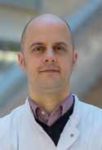Saturday, 21 September 2024, 09:15 – 10:00

Henrik Oster
University of Lübeck, Institute of Neurobiology
Circadian rhythms and sleep
In my teaching lecture I will describe how circadian clocks and sleep interact in shaping physiological functions and homeostatic setpoints. I will start by outlining evolutionary concepts of sleep and its regulatory mechanisms and circuits. I will then move on to describe the molecular and anatomical basis of circadian timekeeping and how both processes influence each other. Finally, I will provide some examples of how circadian and sleep disruption affects health and well-being and how both systems can be used as tools to decipher complex biological traits such as metabolic homeostasis.
Henrik Oster graduated as a biochemist from the Leibniz University Hannover. As a PhD student in Urs Albrecht’s lab at the University of Fribourg (CH) he became interested in studying circadian clocks and rhythms. From 2002 to 2007 he worked as a postdoc in the labs of Gregor Eichele (Max Planck Hannover (DE)) and Russell Foster (Oxford University (UK)). In 2007 he started his own lab as Emmy Noether group leader at the Max Planck Institute in Göttingen (DE) before joining the University of Lübeck (DE) as Lichtenberg professor in 2011. Since 2018 he is director of the Institute of Neurobiology and Endowed Lichtenberg Chair in Lübeck. He continues to study circadian clocks, now with a focus on endocrine functions and behavior.


